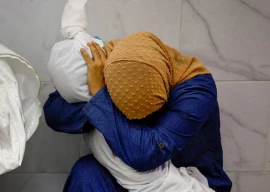
KARACHI:
Making a strong case for the privatisation of state-owned enterprises (SOEs), veteran banker and former finance minister Shaukat Tarin called on Saturday to consolidate 13 SOEs under one holding company, which could operate independent of federal ministries as a first step towards their privatisation.
“No improvement can be expected as long as the bureaucracy and ministries are calling the shots at these SOEs,” Tarin said while speaking at the Business Leaders Conference 2012, organised by the Institute of Cost and Management Accountants of Pakistan (ICMAP).
Pakistan State Oil, Pakistan Petroleum, Sui Southern Gas Company, Sui Northern Gas Pipelines and Oil and Gas Development Company should also be part of the proposed holding company, although they were profitable entities for the time being, he added.
“They’re causing Rs500 billion losses every year in subsidies, which translates into roughly 2.5% of gross domestic product (GDP),” he noted. He said his proposal, which was approved in principle while he was still in charge of the Ministry of Finance, called for setting up a 12-member board tasked with turning around the SOEs within five years.
“The board should be headed by a private sector professional with only four out of 12 members coming from the government. The holding company should self-destruct itself after cleaning up the balance sheets of these companies, paving the way for privatisation,” he said, adding the same strategy had worked successfully in Malaysia and the United Kingdom.
Brushing aside fears that the holding company could possibly fail to stabilise the loss-making SOEs, the veteran banker cited the examples of various Pakistani banks, which became profitable after undergoing restructuring and privatisation in the 1990s.
He said when Nawaz Sharif asked him to take over Habib Bank in the 1990s, he demanded the reconstitution of its board of directors besides the authority to hire and fire people without government’s interference. “To his credit, he kept his word and did not interfere. We turned around the loss-making bank into one of the most profitable entities of the country just in a few years.”
Criticising the banking sector for its overreliance on government securities, Tarin said many bankers were risk-averse, which prevented them from forecasting future trends.
He said the huge influx of money in post-9/11 years took the banking sector by surprise. “Interest rates crashed from 12-13% to a level where big corporations could get a loan at 2.5%. They responded by hastily expanding their consumer banking operations, for which they had to face consequences in 2008-09.”
Speaking on the occasion, AF Ferguson and Company Partner Shabbar Zaidi said paying taxes was not part of the Pakistani culture.
Calling for the decentralisation of tax collection in the country, Zaidi said the Federal Board of Revenue (FBR) should publish the entire list of taxpayers on its website. “Only 200 companies pay 85% of the income tax collected in Pakistan. Over 80% of total taxes are indirect. Except companies and salaried people, nobody pays taxes,” he said.
Zaidi said the FBR should be turned into an independent body free of federal government bureaucracy along the lines of the State Bank of Pakistan. “The FBR’s job should be restricted to collecting income tax while all other taxes should be collected at the municipal and provincial levels.”
Published in The Express Tribune, November 18th, 2012.
COMMENTS (1)
Comments are moderated and generally will be posted if they are on-topic and not abusive.
For more information, please see our Comments FAQ


































































Good suggestion, but who will listen to him, no wonder he opted out by himself after realizing that most of these half-read people in govt are trying to pressurize him for unfavorable decisions...